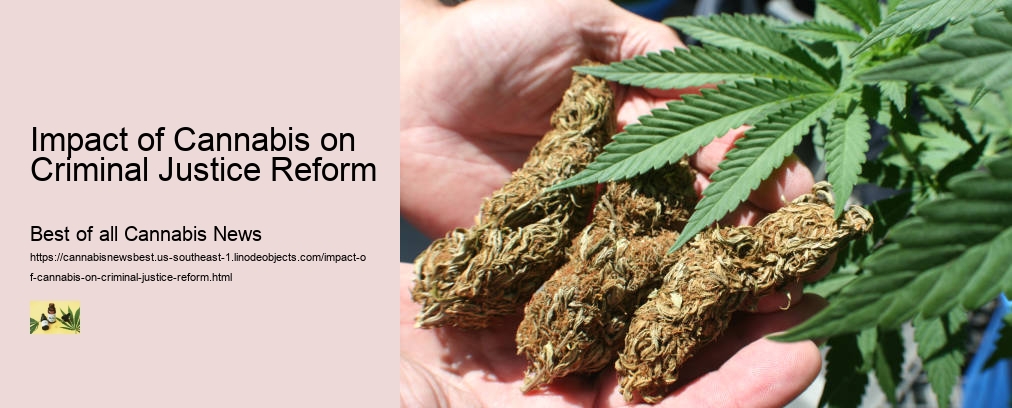

The history of cannabis prohibition has had a significant impact on criminalization and the criminal justice system as a whole. The criminalization of cannabis dates back to the early 20th century, when various laws were enacted to restrict its use and possession.
These laws have not only led to the arrest and incarceration of countless individuals for non-violent drug offenses, but they have also disproportionately affected communities of color. The War on Drugs, which was largely fueled by the prohibition of cannabis, has resulted in mass incarceration rates that have devastated families and communities across the country.
Furthermore, the criminalization of cannabis has perpetuated a cycle of poverty and disenfranchisement, as individuals with drug convictions often face barriers to employment, housing, and education. This has had long-lasting consequences for these individuals and their families, creating a vicious cycle that is difficult to break free from.
As attitudes towards cannabis have shifted in recent years, with many states legalizing its use for medicinal and recreational purposes, there has been a growing movement towards criminal justice reform. Many advocates argue that the decriminalization or legalization of cannabis is essential in order to reduce the harm caused by its prohibition and address the systemic issues within our criminal justice system.
In conclusion, the history of cannabis prohibition has had a profound impact on criminalization and has contributed to many of the injustices within our criminal justice system. It is crucial that we continue to push for reform in order to address these issues and create a more just and equitable society for all.
Over the past few decades, there has been a significant shift in public opinion regarding cannabis and its impact on criminal justice reform. As more states and countries have legalized or decriminalized the use of cannabis, there has been a noticeable decrease in arrests and convictions related to cannabis offenses.
Statistics on arrests and convictions related to cannabis offenses paint a clear picture of how these changes have affected the criminal justice system. In states where cannabis has been legalized for recreational use, there has been a dramatic decrease in arrests for possession and distribution of marijuana. This not only reduces the burden on law enforcement agencies but also frees up resources to focus on more serious crimes.
Furthermore, with fewer people being arrested and convicted for cannabis-related offenses, there is less strain on the court system and prisons. This allows for a more efficient allocation of resources towards rehabilitation programs and addressing underlying issues such as substance abuse.
Moreover, the legalization of cannabis has also had a positive impact on communities that were disproportionately affected by drug laws. Minority populations, in particular, have been targeted at higher rates for cannabis offenses despite similar rates of use among different racial groups. By legalizing cannabis, we are taking steps towards addressing systemic inequalities within our criminal justice system.
Overall, statistics on arrests and convictions related to cannabis offenses demonstrate the positive impact that legalization can have on criminal justice reform. By shifting away from punitive measures towards more rehabilitative approaches, we can create a fairer and more effective system that benefits both individuals and society as a whole.
The economic benefits of legalizing cannabis for the criminal justice system are numerous and significant. By legalizing cannabis, we can reduce the strain on our already overburdened criminal justice system. This means that law enforcement officials can focus their resources on more serious crimes, rather than wasting time and money on low-level drug offenses.
Additionally, by legalizing cannabis, we can generate revenue for the government through taxation. This revenue can then be used to fund various programs and initiatives within the criminal justice system, such as rehabilitation programs for offenders or training programs for law enforcement officers.
Furthermore, legalizing cannabis can also create new job opportunities in the industry, from growers and distributors to retail workers. This not only helps stimulate the economy but also reduces unemployment rates in communities where cannabis is legalized.
Overall, the economic benefits of legalizing cannabis for the criminal justice system are clear. By reducing strain on law enforcement resources, generating revenue through taxation, and creating new job opportunities, legalization can have a positive impact on our society as a whole.
One of the biggest challenges and obstacles to achieving meaningful reform in cannabis laws is the stigma and misinformation surrounding the plant. For decades, marijuana has been demonized and criminalized, leading to biased beliefs that have shaped public perception. This negative stigma has prevented many from seeing the potential benefits of cannabis legalization, such as its potential to reduce incarceration rates for nonviolent drug offenses.
Another obstacle is the political landscape surrounding cannabis laws. Many lawmakers are hesitant to support reform due to fear of backlash from their constituents or concerns about losing federal funding. This reluctance to take a stand on cannabis reform can hinder progress and maintain outdated policies that disproportionately impact marginalized communities.
Additionally, there are economic interests at play that can influence the push for reform. The pharmaceutical industry, private prisons, and law enforcement agencies may lobby against cannabis legalization in order to protect their profits and power. These powerful entities can wield significant influence over policymakers, making it difficult to enact meaningful change.
Despite these challenges, there is growing momentum for cannabis reform across the country. States like Colorado and California have seen success with legalizing recreational marijuana, demonstrating the positive impact it can have on criminal justice reform. By educating the public, advocating for policy changes, and mobilizing grassroots movements, we can overcome these obstacles and work towards a more just and equitable system for all individuals impacted by cannabis laws.